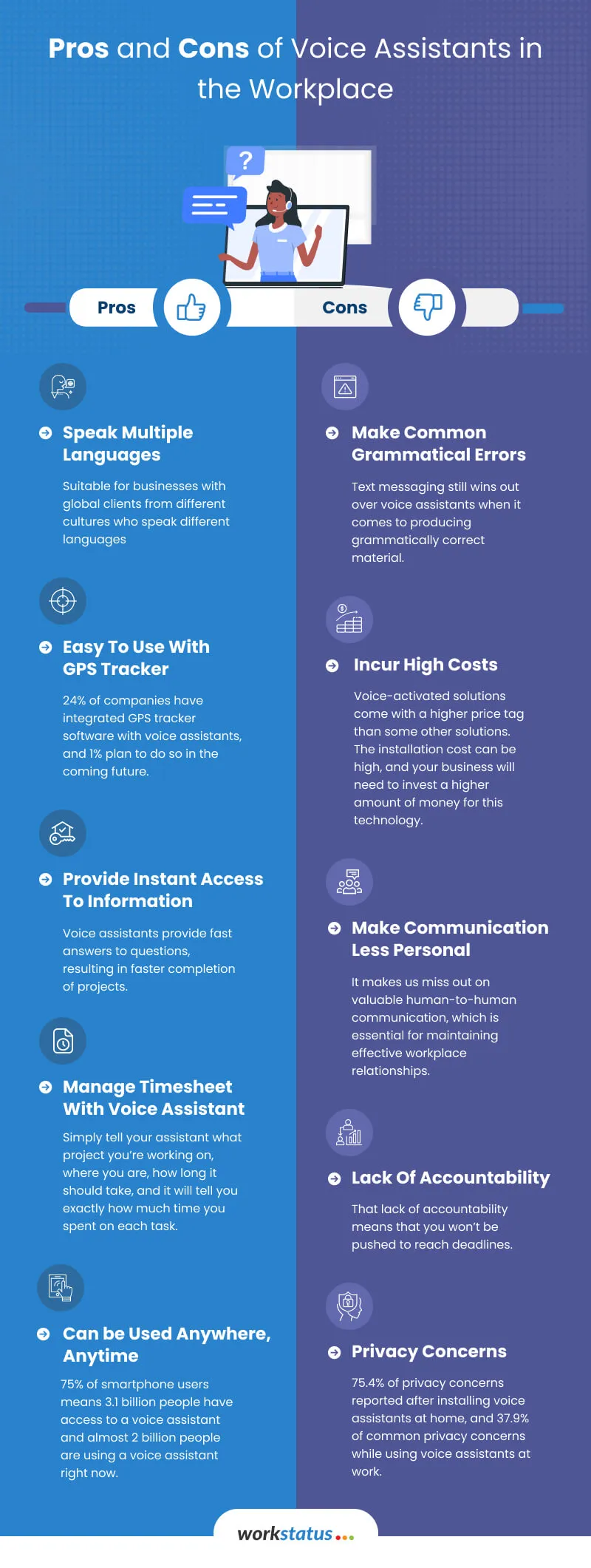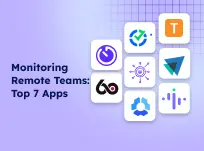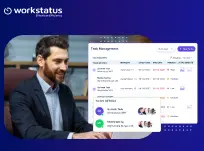Table of Contents
Introduction
Voice assistants have been around since the early days of the Internet, but it wasn’t until Apple introduced Siri in 2011 that they became an essential part of our everyday lives. The technology and uses of digital assistants have grown exponentially since then, and now these voice-activated tools are being used in places beyond our homes and phones, such as in the workplace.
Microsoft has made waves with its Cortana, and Google has released its own offering known as Google Assistant. Digital assistants like Alexa and Siri are now available to help us with everything from directions to sending emails, making it easier for companies to adopt them to help streamline their daily tasks.
While voice assistants are an incredible convenience, they also have some significant drawbacks. These assistants could end up hurting your company rather than helping it.
In order to help you out, we have compiled a list of five pros and cons of voice recognition/assistance that will help you in making an informed decision about whether you need to opt for voice assistance for your organization or not.
But before digging deeper, let’s first understand what voice assistants are.
What are Voice Assistants?
A Voice Assistant is a digital assistant that you can interact with through voice. There are many different types of voice assistants, such as Siri, Cortana, and Alexa. Each has its own individual purposes and design, but all fall under one umbrella.
These assistants allow users to input information into a machine by talking instead of typing. They are an efficient way to enhance productivity while keeping human error to a minimum.
This generation of digital assistance is becoming more popular among workplaces across the world because they help employees to be more effective during work hours and help employers improve production within their companies.
How is Voice Assistance Transforming our Day-To-Day Lives?
Digital assistants like Amazon’s Alexa and Apple’s Siri are transforming our lives by making daily tasks easier.
Imagine saying ‘Alexa, order groceries’ and receiving a reminder to do so later that day, or asking ‘Siri, when is my next meeting’ before heading out to work and getting directions right then, seamlessly integrating with meeting software to keep you organized.
These conversations save us time, energy, and eliminate mundane tasks from our day-to-day lives, making them efficient tools for improving productivity.
But what about their use in business environments?
The answers might surprise you. Many enterprises have already begun implementing these digital assistants into their offices with positive results!
These assistants help them run more efficiently while keeping communication open between employees and colleagues, eliminating tedious requests that would otherwise need manual assistance.
With tech innovating at such a rapid pace, digital assistants will continue to transform how we live and work.
Now, let’s take a look at the pros and cons of voice assistants.

Pros of Voice Assistants
1) They Can Speak Multiple Languages
You don’t have to worry about what language you’re speaking. Voice assistants understand a variety of languages and make communicating much easier for workers and make them much more productive than ever before.
Customers with different languages won’t be any problem at all. Just speak your desired language, and these voice assistants will translate that in no time. Once translated, they will communicate your words to the person sitting on another side of the globe.
These assistants can also help us in interacting with different individuals while we are travelling to different countries.
2) They are Easy to Use with GPS Tracker Software
GPS tracking software is great for keeping employees accountable by knowing where they are at all times. These GPS time tracker programs work seamlessly with virtual voice assistant tools, making it even easier to monitor your team members.
Many business owners use them because they need an easy and quick way to get information about what their employees are doing and where they are during work hours. This kind of information shared by voice assistants and GPS trackers with managers can go a long way toward increasing productivity and having a solid workforce.
By using voice assistant apps with GPS time tracker software, you can make sure that your employees have everything that they need while they are on the go.
3) They Provide Instant Access to Information
By using voice assistant technology, you can get access to information without having to search through your phone. This saves time and allows for more engagement with colleagues as opposed to being on your phone all day.
Having a voice assistant gives us instant access to knowledge while still allowing our hands to be free from tasks such as writing down notes or looking things up online. It’s like an expert available at any time. This can lead to increased focus and efficiency among employees.
4) Easy to Manage Timesheet with Voice Assistant
We often hear that our customers love how easy their employees find their paperless time tracker to manage their timesheets with voice assistants and that they would never go back to the manual method again!
Benefits of voice assistant: Using voice assistants at work can help in reducing timesheet errors and has a host of other benefits for businesses. By working with time tracking software and voice assistants together, it becomes much easier for you to update employee’s timesheets.
5) We can Use Them Anywhere, Anytime
People can use voice assistants as per their work needs anytime and anywhere. They don’t need to be at a desk or working with a computer to get help with things like emails, scheduling meetings, etc.
They can simply get all the desired information through voice assistants in an instant. This gives higher flexibility that was not possible before these devices came out on the market.
Moreover, they are much more versatile than laptops because people can carry them anywhere, so they always have access when needed. If a person has an Android or iPhone phone, then installing them is very easy, which makes it feasible for everyone to use them.
Cons of Voice Assistants
1) They Make Common Grammatical Errors
Voice assistants typically don’t catch grammar errors when you speak. If you aren’t careful, voice assistants can quickly make minor mistakes that will be reflected in your writing, thus diminishing your company’s professional image.
Even worse, it makes your staff look unprofessional to have grammatical and spelling errors all over their documentation which can result in huge losses in clients and revenue if not rectified immediately.
2) They Incur High Costs
The initial cost of smart speakers is usually more than a PC or mobile device. Of course, once you own a smart speaker, it’s less expensive over time to use than a computer or other mobile device for such tasks as checking email and scheduling meetings. Still, there’s no denying that IT departments have to budget extra money for these devices.
In fact, Gartner has estimated that companies have to pay on average $355 per employee each year to supply them with smart speakers even before employees start using them to help with their jobs. This is huge when compared to traditional PC spending, which averages around $220 per user annually.
3) They Make Communication Less Personal
One of the significant drawbacks of voice assistants is that they make communication less personal. There’s something inherently cold about a disembodied voice at a machine dictating your messages and tasks rather than an actual person.
The lack of a physical presence takes some of that warmth out. When it comes to interpersonal communication, it makes such interactions feel rushed and perfunctory. This way many businesses can lose their engagement with their clients.
4) Lack of Accountability
While voice assistants help increase productivity, they also lack accountability. Email and other systems are a way to hold an employee accountable for completing tasks on time. With voice assistants like Alexa or Siri, there’s no such system in place and more likely that some of the tasks may get lost without an assigned deadline date.
Moreover, voice assistants lack proper feedback mechanisms. A task could take too long to be completed, but you wouldn’t know unless you asked if it was done yet.
So it’s hard to track progress by using these digital assistants. The lack of oversight can lead to disorganized processes throughout your business.
5) Privacy Concerns
Privacy is the primary concern when it comes to using voice assistants. They can easily store and send recordings, which means they could fall into anybody’s hands. And that’s definitely not something you want happening with sensitive business information.
Also, if anyone gets a hold of your device, they can figure out personal details about you or others around you without even having to hack anything.
That’s why it’s essential to make sure nothing is connected or synced with these assistants if you don’t want them to record it or even worse, to leak it online.
5 Ways Voice Assistants Could Boost Business Productivity
Voice assistants have transformed how we communicate with technology over the last few years. With more intelligent devices being developed, the future of voice assistants looks even brighter for business productivity as they help businesses streamline some tasks and focus on the overall enhancement of the organization.
Here are 5 ways voice assistants could boost business productivity and efficiency.
1) Automate repetitive tasks
A voice assistant can automate repetitive tasks, such as scheduling meetings, or following up with prospects. You don’t have to manually do these actions yourself. Just sit back and relax while Siri or Alexa handles it.
The time saved from not having to do these tasks yourself can be spent on more productive tasks such as planning future projects, brainstorming ideas, and enhancing the business growth and success rate.
2) By setting reminders and timers with just one command
One of the best ways voice assistants can boost your productivity is by setting reminders and timers with just one command. For example, instead of taking time to set a timer on your phone, you can simply ask Siri or Alexa to do it for you.
You just have to say hey, Siri set a timer for 10 minutes, then that’s all, your timer has been set. Likewise, you can ask Alexa to set reminders. Just say, Alexa, remind me to call Jack at 8 pm. You will get a notification when it is time.
With such convenience, the voice assistant is making our life much easier because there are no more distractions and worries about forgetting what we want to be reminded about, resulting in enhanced efficiency, productivity, and management of everything.
3) Increase Efficiency with Data Entry
The process of data entry is tedious and time-consuming. But with voice assistants, you can ask Siri or Alexa to enter data for you. You just have to ask your assistant to add the information in a specific format that you require, and it’ll be done in no time.
Which makes the entire process much faster and also help in avoiding making errors which results in better work output and increased efficiency.
4) Make hands-free calls
Voice assistants can make hands-free calls, answer emails and texts, set alarms and reminders, search the web, schedule meetings and events, play music on demand, control smart home devices, and more. For business users, this means that they can get more done in less time with minimal distractions.
5) Help with Time Management
One of the most common ways voice assistants could boost business productivity is by helping with time management. When you have a meeting coming up, your assistant can let you know what time it starts and when to leave to make it on time.
This type of information helps with managing your schedule but also helps you prepare for meetings in advance to help you prepare better and accomplish more during the meeting itself.
With these 5 ways through which voice assistants could boost business productivity, your company can experience a surge in efficiency that will lead to greater overall success and productivity.
The Top 3 Voice Assistants for Businesses
Here are the three most popular voice assistants on the market that help businesses to grow and streamline the workforce process.
1) Google Assistant:
It’s a powerful AI-based assistant constantly evolving to help you with everyday tasks, from scheduling meetings to answering questions about your day. It is a one-stop shop.
The best part?
It can work across all of your devices, making it one of the smartest and most personalized voice assistants to opt for.
2) Apple Siri:
Siri is your go-to voice assistant if you are an iPhone user. It has been refined over time and can quickly work with third-party apps to perform various tasks, including checking email, playing music, creating reminders, setting timers, and more.
It is one of the best choices for iPhone users. It also works seamlessly between iPhones and other Apple products like iPads and Mac computers, so there’s no need to worry if you have multiple devices.
3) Amazon Alexa:
If you own an Alexa-enabled device, like a speaker or Amazon Tap, then Alexa is your best bet. It’s excellent at understanding a range of verbal commands and questions and can quickly answer various questions. Y
ou can use Alexa to control your smart devices, manage tasks or even order pizza with your voice. The list goes on and on regarding what you can do with Alexa, making it one of the best options for those looking to get started with a voice assistant in their business.
In conclusion, these are the three top options for you to consider. All three offer something different depending on what you need out of your technology.
Next Steps
Educating employees about how voice assistants can be used is a good first step. Employers can take steps to make sure voice assistants are used responsibly.
By ensuring that employees know they’re being recorded, employers can restrict the employees from sharing personal or private information while using these devices.
Businesses should also use employee time tracking software to enable remote access and maintain records on devices used by their staff members.
If you want to opt for a time tracker with GPS that can integrate with voice assistants, you must try WorkStatus.
Workstatus is the best employee timesheet software for tracking time online, integrating with voice assistants, and ensuring that your team always has up-to-date status.
Using such a tool ensures that everyone on your team has access to a simple and intuitive way to track time and report back on their progress. And, once you get started using our software, you’ll find it makes managing employees incredibly easy.
So what are you waiting for?
Try out WorkStatus today and see how it can benefit your business.
Sign up today and claim your 7 days free trial now
Conclusion
It’s clear that voice assistants are here to stay, and now it’s time for organizations to start implementing them into their business operations. The sooner you can integrate these new tools into your company culture, the faster you’ll realize all of its potential benefits, including productivity gains and an increase in customer satisfaction.
However, there are some points you should consider essential when introducing such technology. By weighing up these pros and cons beforehand, you can successfully prepare your employees, customers, and yourself for any changes that occur.
So what do you think? Are voice assistants suitable for your organization?
Let us know in the comment section below!
Also, stay tuned for our next awesome post.
Till then, keep visiting our website to get more information on future updates and share our content across social media.
Thank You !!












